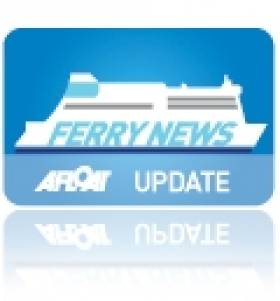Displaying items by tag: Irish Continental Line
Former B+I Line Freight-Ferry Bound for Turkish Breakers
#FERRY NEWS-P&O Irish Sea's Larne-Troon freight-ferry Norcape (14,087grt) departed the Co. Antrim port last week to be broken-up at ship-breakers in Aliaga, Turkey. She originally served B+I Line as the Tipperary, but her last sailings took place on the North Channel in late November, as the ageing vessel is in her fourth decade of service, writes Jehan Ashmore.
The 125-trailer capacity ro-ro was not replaced on the single-ship operated route which closed for the winter months, though sailings will resume next March by the 92m fast-ferry Express. In the meantime freight traffic will be accommodated on the companies Larne-Cairnryan service.
Yesterday morning Norcape transitted the Strait of Gibraltar having called en-route to Falmouth several days previously. She represented the last vessel to serve in Irish waters with a direct link to B+I Line, the state-owned operator which was sold in 1992 to ICG, parent company of Irish Ferries.
When she arrives in Aliagra, this is where her former P&O fleetmate European Mariner (5,897grt) was scrapped after also serving Larne-Troon sailings until last July. Norcape entered the North Channel route replacing the smaller 53-trailer capacity vessel.
Prior to then Norcape had been in laid-over in Liverpool docks when European Endeavour replaced her in February on the Dublin-Liverpool route. To read more click HERE.
Norcape's return to the Irish Sea service in 2009, reflected her original career for P&O. She was named Puma in 1979 from the Japanese shipyard at the Mitsui Engineering & SB Co Ltd, Tamano, however she was chartered to B+I Line and renamed Tipperary. To read more and to view a deck-drawing profile, click HERE.
Her career started with a new Dublin-Fleetwood route jointly operated with P&O, who contributed with a sister, the Ibex. The P&O brand name Pandoro stood for P and O Ro, their roll-on roll-off freight division. The route's UK port switched to Liverpool in 1988 with Tipperary remaining on the route until sold to North Sea Ferries in 1989 and renamed Norcape.
Before her transfer to the North Sea, Tipperary collided with the 4,674grt bulker Sumburgh Head off the entrance to Dublin Port in 1988. Incidentally the two vessels, under different names and ownership were in Dublin Port in 2010, as previously reported (with photo) click HERE.
- Ports and Shipping News
- Norcape
- P&O (Irish Sea)
- B+I Line
- European Endeavour
- Ferry news
- Irish Sea Ferries
- Irish Sea ferry news
- LarneTroon
- MV Tipperary
- Turkish shipbreakers
- P&O Express
- MV Ibex
- Pandoro
- Aliagra,Turkey
- MV Norcape
- ICG
- ICG Group
- Irish Continental Line
- North Channel ferry routes
- LarneCairnryan
- Irish Ferries
























































